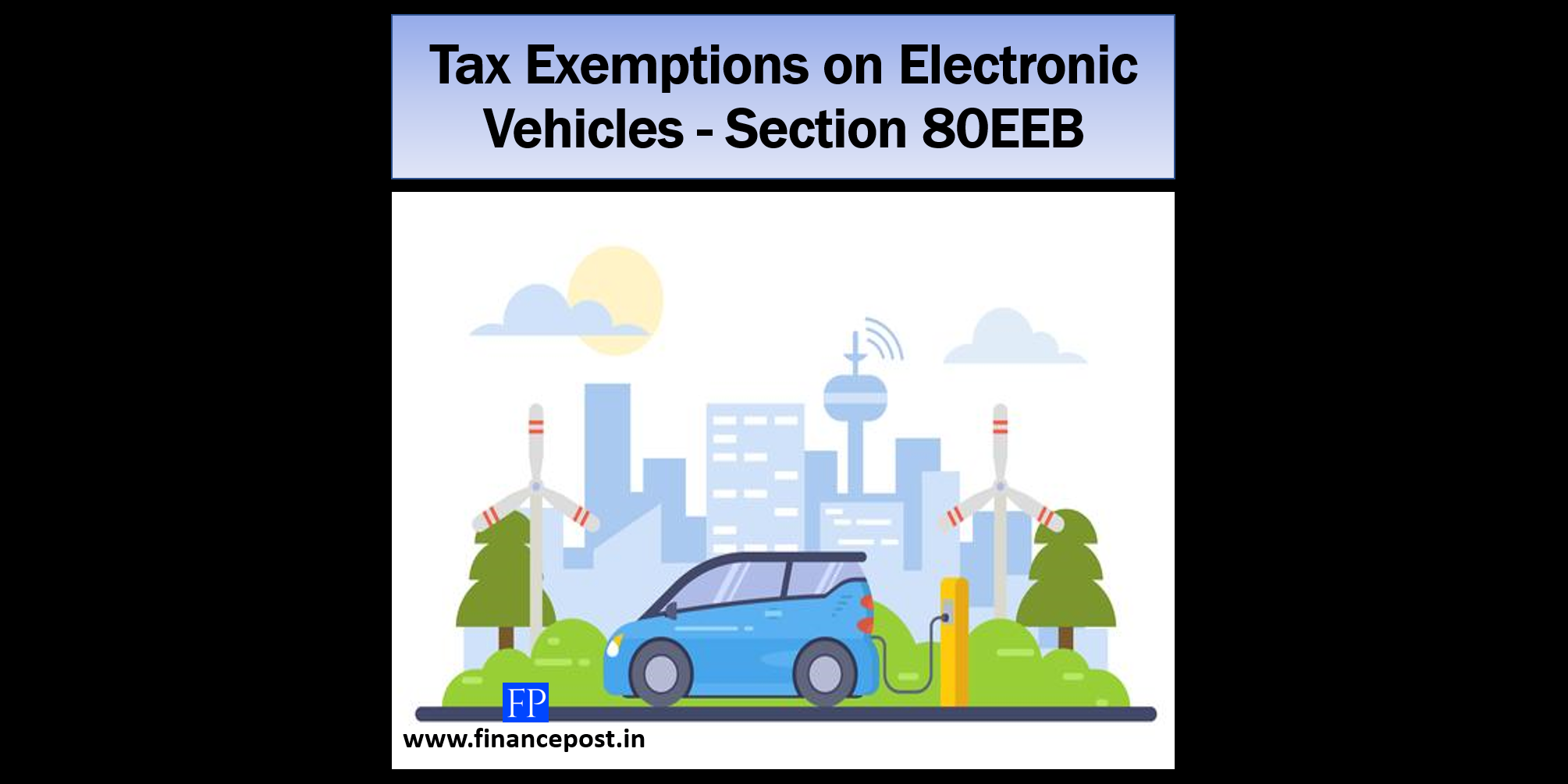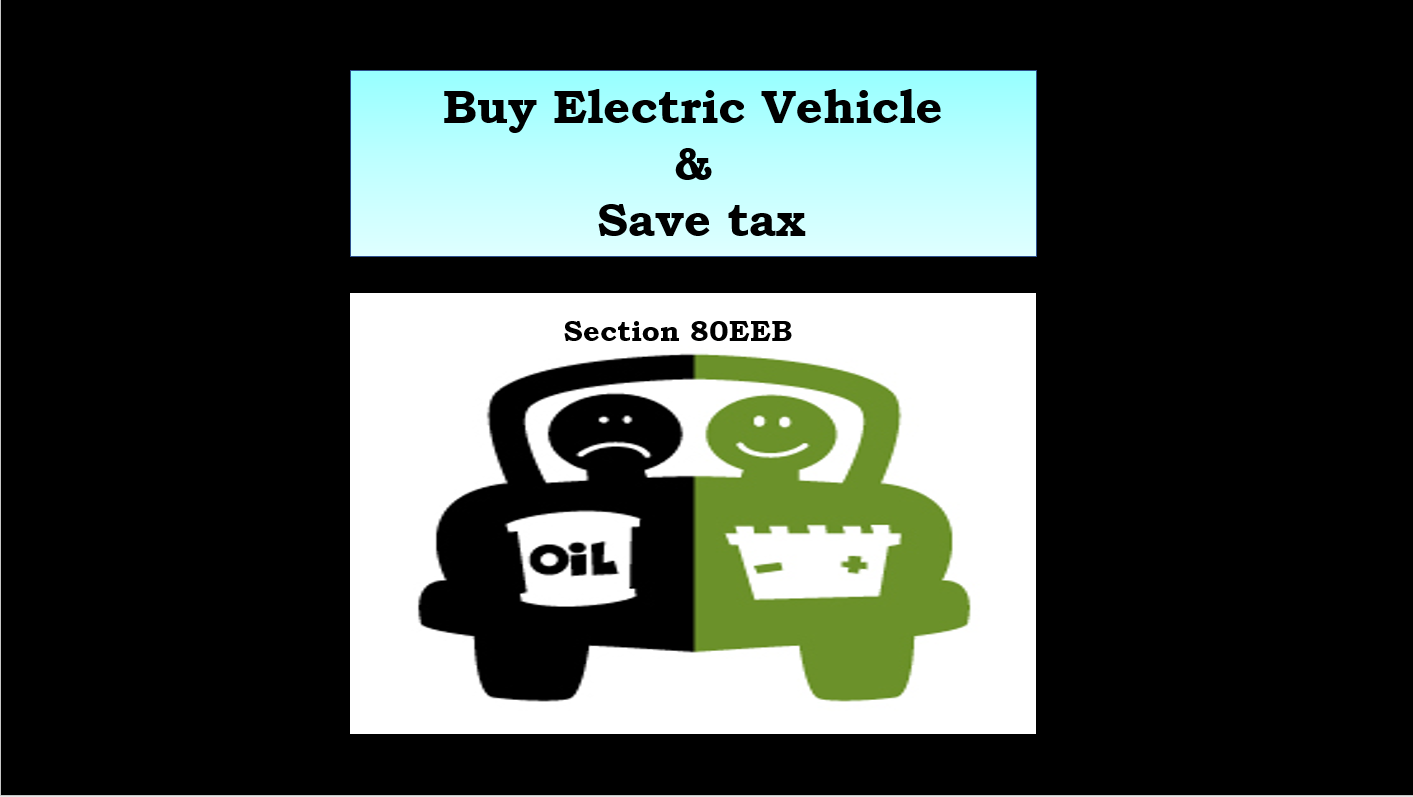
Last updated on August 7th, 2022 at 08:11 pm
Tax Exemptions on Electronic Vehicles – Section 80EEB – Introduction
The rising pollution levels in our country have forced our government to take some steps to curb this monster’s multiplying steps in our country and to save our land from its destruction. There are various measures that can be taken up to put a stop to this menace and one of these is Electronic Vehicles. The low-level emission vehicles which ply on the road make minimum noise and moreover add nothing to the already degraded environment of our Earth. It’s the best card that we can play so that we can get to live in a healthy environment. To encourage the use of such cars, the Government has introduced certain tax exemptions on Electronic Vehicles.
In the Finance Budget 2019, the government introduced certain exemptions under the Direct Scheme wherein if you are taking a loan for the purchase of Electronic Vehicle then the Interest paid will act as a deduction from your taxable income. This scheme comes under Section 80EEB and will be in force from the Assessment Year 2020-21. This new section which has been introduced will encourage more and more buyers to go for Electronic Vehicles for the betterment of our environment and control the rising pollution level. This positive step urges customers to work for the environment and pay their contribution to the environment. Electronic vehicles are already a hit in many of the countries and are slowly catching up in India with many manufacturers coming out with new and faster models. These cars are a little bit on the costlier side due to its costly components. Thus, giving such an exemption is a very nice move from the government.
Earlier Exemptions
Since we are talking of Vehicle Loan Exemption, we can talk about exemptions on other kinds of Vehicle Loans. Talking about it, it should be mentioned that there are no such exemptions on Vehicle Loans other than Electronic Vehicle Loans. These exemptions have been introduced to simply encourage people to go for electronic vehicles rather than vehicles of other engine variants.
What does Section 80EEB tell us?
We have already read about this in the introductory part and by just broadening the scope in this section we can tell that this exemption is available only to individuals who go for such kind of vehicles. Other than this, this kind of exemption is not available to any other kind of taxpayer under the ambit of the law.
Thus, if you are a taxpayer who is a Hindu Undivided Family(HUF), Association of Persons(AOP), Partnership firm, a Company, you cannot extend a claim under this section. To claim this deduction, proper documents and details of the vehicle should be explained which are mentioned in the sections below.
The amount which is to be exempted under Section 80EEB
The deduction amount available for interest payment of Electronic Vehicles under Section 80EEB is Rs. 1,50,000. Now, there are two aspects which have to be looked into while claiming the deduction. These two aspects are the purpose for which is being put to use by that concerned individual. The first situation can be that the vehicle could be put to personal use or could be put to business use.
In both such cases, the individual can claim for the deduction, i.e. the amount of Rs. 1,50,000. Except when the vehicle is used for a business, the amount exceeding Rs. 1,50,000 can be claimed as a business expense. This can only be done only if the vehicle is registered in the name of the owner or in the name of the business enterprise for which it is being used. Another addition to this point is to obtain the right documents and produce them while filing the return.
The important documents to be provided are :
- Proof that the Interest accrued on the account of the loan taken is being paid and proper documents such as Bank Passbook photocopy or Interest Paid Certificate should be produced.
- Tax Invoice of the car should be produced.
- Loan Documents should be produced if asked for verification.
- The filling should be done under the proper ambit of law and any irregularities shall result in some bad consequences.
Conditions that are required for claiming such deductions
There must be certain conditions that should be fulfilled before filling for such an exemption. These conditions are:
- A loan for an Electronic Vehicle should be taken from a financial institution or a non-banking financial company and not from any other source.
- A loan for an Electronic Vehicle must be sanctioned anytime during the period from 1st April 2019 till 31st March 2023 respectively.
- Specifications of the “Electric Vehicle” should be properly defined. The definition should give information about the power source of the vehicle which should specifically be an electric motor and nothing else. This Electric Motor’s traction energy should be supplied exclusively by a traction battery which should be installed in the vehicle. In addition to this, the Electric Vehicle should have an Electric Regenerative Braking System which when activated should provide for the entire process to convert the Kinetic Energy produced into Electrical Energy.
How Section 80EEB would help the Government’s schemes?
The Union Government seems to be very adamant on its goal to achieve a level of comfort in the pollution level of the country. Thus, it is taking up such schemes which shall only help towards achieving it. Apart from such exemptions on the financial front for faster adoption, there are other things that are being taken up too and this step will give it a more concrete outcome. The approval of Phase II of the (Faster Adoption and Manufacturing of Electric Vehicles) FAME scheme for the promotion of electric mobility in the country will give the government fast-paced steps toward its goal. Phase II of the scheme started on 1st April 2019 and will be completed by 31st March 2022.
FAME is one of the innovative schemes of the Government of India which works toward promoting Electric and Hybrid Vehicles in the country for fulfilling the pollution control goals. The main goal of this scheme is to promote electric mobility and environmental awareness. Apart from this, the scheme offers attractive financial incentives to individuals who would like to purchase such Electric Vehicles to participate in the government’s objective. The incentive shall also be given for the creation of Electric Transportation and the setting up of Vehicle Charging Infrastructure. This incentive is available for 3 Wheelers, 4 Wheelers, and electric 2-wheelers.
Incidentally, Phase II of FAME has a total outlay of Rs 10,000 Crores which is laid out over a period of 3 years starting from the 1st of April 2019 up to the 31st of March 2022. Apart from this, the Government is also looking forward to encouraging Electronic Vehicle manufacturing hubs in the country.
Exemptions in other countries
Apart from India, the rising pollution level is a matter of concern for countries all around the globe. Let’s take a look at their schemes when it comes to EVs.
- The European Union is granting exemption from taxation for acquiring such Electronic Vehicles. They have classified their vehicles under various categories such as Battery Electric Vehicle(BEV) and Hybrid Electric Vehicle(HBV) among others. Accordingly, the exemptions are given with relation to the emission level of such vehicles. Also, some special rule is applied to different variants in different countries. Apart from this, certain purchase incentives are also given for buying EVs based on their models. These rules shall always work in favor of the Government’s views to eradicate pollution. These exemptions not only help the government to achieve their objectives but also motivate the various manufacturers to go for the manufacturing of such vehicles which shall only help in preventing our Earth’s degrading condition.
- In the US, the federal Internal Revenue Service (IRS) is providing tax credit from $2,500 to $7,500 for every new EV purchased in the US. The Tax Credit provided is directly proportional to the size of the vehicle along with its battery capacity. But there is a catch to it. The proposed Tax Credit shall only be given until and unless 200,000 EVs have been sold in the United States by each of the manufacturers of such vehicles. To claim such Tax Credit, you have fill up certain IRS forms.
- Upfront we also have Sri Lanka which has taken up such a step. The country is providing Tax Exemptions on Electronic Vehicles and has changed its taxation on the non-electric models to push the people to go for such vehicles.
Apart from these, all the major countries are trying to give their best to curb the pollution levels by bringing in such incentives.
Conclusion
The introduction of tax exemption on electric vehicles by the government has turned out to be a huge relief and as a matter of fact, a new aspect in the region. It definitely is a good initiative for more and more people to be encouraged to use elective vehicles which can be beneficial for the environment. There are certain documents that are essential for a person to claim tax exemption under this section. The amount which can be claimed is 1,50,000 Rupees. This will in turn help in many government schemes to be prospered among the common public. Many countries also offer quite a few exemptions on electric vehicles.
Let’s take a look at some of the Frequently Asked Questions(FAQs) based on this topic:
No, the rule applies for each and every manufacturer in the Electronic Vehicle domain. It only requires you to take the loan from a core Financial Institution or a core Non-Banking Financial Institution. This is one of the most important prerequisites of this exemption which is being given. In addition to this, the date of sanction of the said loan should be between 1st April, 2019 and 31st March 2022. Proper details of the vehicle should be given in order to prove it an Electronic Vehicle. Thus, the manufacturer doesn’t matter while giving such an exception.
There is no such limit as to the amount of loan that we should be going for. You can avail any amount but the exemption is implied on the maximum interest value of Rs. 1,50,000 only and in case of individuals who are using their vehicle for business purposes, any amount exceeding Rs. 1,50,000 shall be deemed as business expenses. Concluding this new development, we can say that this will help us in curbing this serious problem which has been plaguing us. Section 80EEB will push many to go for these environment-friendly modes of transports.
Section 80EE Deduction can be claimed by an individual for amount paid as interest on home loan. The maximum deduction under Section 80EE is Rs.50,000. Section 80EE deduction can be claimed over and above the deduction of section 24 and section 80C which are Rs. 2,00,000 and Rs. 1,50,000 respectively.
Section 80EE – Deduction on Home Loan Interest. Tax deduction under Section 80EE of the Income Tax Act 1961, can be claimed by first-time homebuyers for the amount they pay as interest on a home loan. The maximum deduction that can be claimed under this section is Rs. 50,000 during a financial year.
VPF offers a higher rate of interest (8.65 percent) and the contributions are eligible for tax exemption up to Rs 1.5 lakh under Section 80C of the Income Tax Act. … However, exiting VPF before five years makes the withdrawals taxable. Investment limit: There is no limit on VPF contributions.
Related Posts
Disclaimer: The above content is for general info purpose only and does not constitute professional advice. The author/ website will not be liable for any inaccurate / incomplete information and any reliance you place on the content is strictly at your risk.
Follow us on Social Media by clicking below
Follow @financepost_in
Be the first to comment